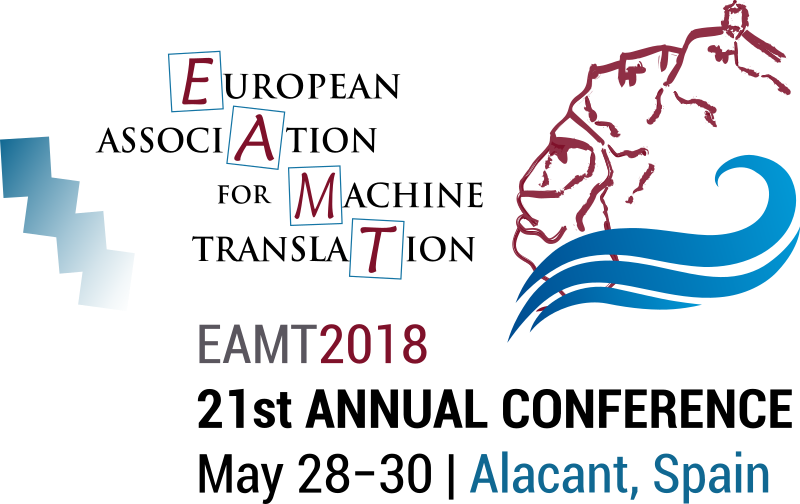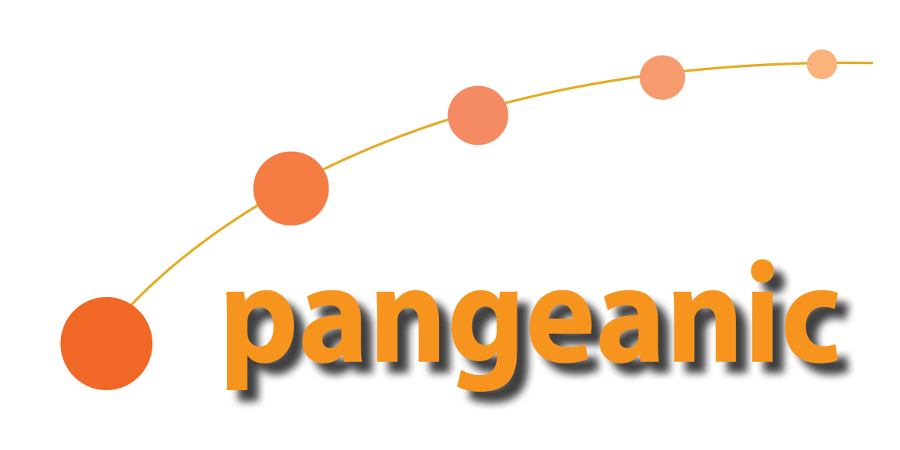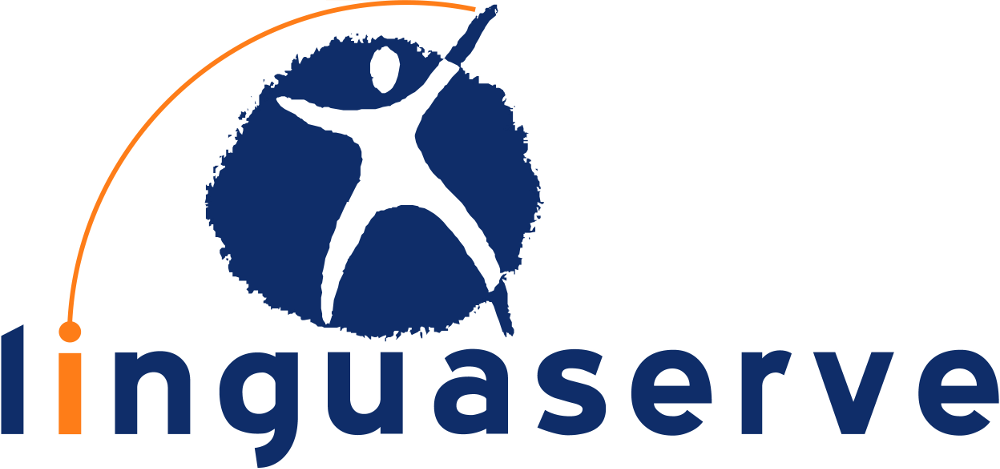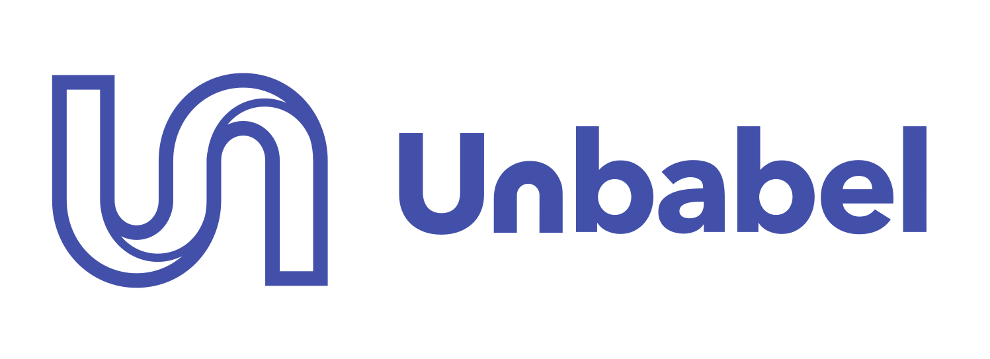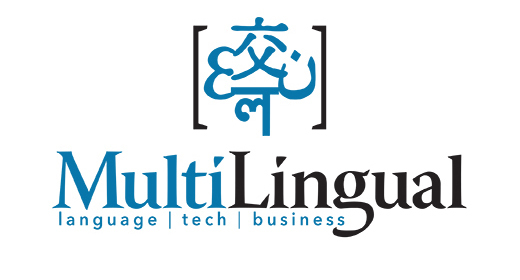The European Association for Machine Translation (EAMT) invites everyone interested in
machine translation, translation-related tools and resources to participate in this
conference ― developers, researchers, users, professional translators and
translation/localisation managers: anyone who has a stake in the vision of an information
world in which language barriers and issues become less visible to the information
consumer. We especially invite researchers to describe the state of the art and demonstrate
their cutting-edge results, and professional MT users to share their experiences. Note also
that individual translators are invited to share their insights in the use of MT and these
will be addressed at a special track.
We expect to receive manuscripts in these four categories:
(R) Research papers
Long-paper submissions (up to 10 pages including references) are invited for reports of
significant research results in any aspect of machine translation and related areas. Such
reports should include a substantial evaluation component, or have a strong theoretical
and/or methodological contribution where results and in-depth evaluations may not be
appropriate. Papers are welcome on all topics in the areas of machine translation and
translation-related technologies, including:
- Novel deep-learning approaches for MT and MT evaluation
- Advances in classical MT paradigms: statistical phrase-based, rule-based, and hybrid
approaches
- Comparison of various MT approaches
- Technologies for MT deployment: quality estimation, domain adaptation, etc.
- MT in special settings: low resources, massive resources, high volume, low computing
resources
- MT applications: translation/localisation aids, speech-to-speech, speech-to-text,
OCR, MT for user generated content (blogs, social networks), etc.
- Linguistic resources for MT: dictionaries, terminology, corpora, etc.
- MT evaluation techniques, metrics, and evaluation results
- Human factors in MT and user interfaces
- Related multilingual technologies: natural language generation, information
retrieval, text categorisation, text summarisation, information extraction, etc.
Papers should describe original work. They should emphasise completed work rather than
intended work, and should indicate clearly the state of completion of the reported results.
Where appropriate, concrete evaluation results should be included.
Papers should be anonymized, prepared according to the templates specified below, and no longer than 10 pages (including references); the resulting
PDFs submitted to the EasyChair
EAMT 2018 page (submission type: EAMT2018 Research).
(U) User studies
Short-paper submissions (up to 6 pages, including references) are invited for reports on
users' experiences with MT, be it as individual translators, in small- or medium-size
business (SMB), in the enterprise, in the government, or in NGOs. Contributions are welcome
on:
- Integrating MT and computer-assisted translation into a translation production
workflow (e.g. transforming terminology glossaries into MT resources, optimizing TM/MT
thresholds, mixing online and offline tools, using interactive MT, dealing with MT
confidence scores);
- Use of MT to improve translation or localisation workflows (e.g. reducing turnaround
times, improving translation consistency, increasing the scope of globalisation
projects);
- Managing change when implementing and using MT (e.g. switching between multiple MT
systems, limiting degradations when updating or upgrading an MT system);
- Implementing open-source MT in the SME or enterprise (e.g. strategies to get support,
reports on taking pilot results into full deployment, examples of advanced customisation
sought and obtained thanks to the open-source paradigm, collaboration within open-source
MT projects);
- Evaluation of MT in a real-world setting (e.g. error detection strategies employed,
metrics used, productivity or translation quality gains achieved);
- Post-editing strategies and tools (e.g. limitations of traditional translation
quality assurance tools, challenges associated with post-editing guidelines);
- Legal issues associated with MT, especially MT in the cloud (e.g. copyright,
privacy);
- Use of MT in social networking or real-time communication (e.g. enterprise support
chat, multilingual content for social media);
- Use of MT to process multilingual content for assimilation purposes (e.g.
cross-lingual information retrieval, MT for e-discovery or spam detection, MT for highly
dynamic content);
- Use of standards for MT.
Papers should highlight problems and solutions in addition to describing MT integration
process or project settings. Where solutions do not seem to exist, suggestions for MT
researchers and developers should be clearly emphasised. For user papers produced by
academics, we require co-authorship with the actual users. Papers should be formatted
according to the templates specified below, no longer than 6 pages
(including references), and submitted as PDF files to the EasyChair EAMT 2018 page (submission
type: EAMT2018 User)
(P) Project/Product description
Abstract submissions (1 page) are invited to report new, interesting:
- Tools for machine translation, computer aided translation, and the like (including
commercial products and open-source software). The authors should be ready to present the
tools in the form of demos or posters during the conference.
- Research projects related to machine translation. The authors should be ready to
present the projects in the form of posters during the conference. This follows on from
the successful ‘project villages’ held at the last EAMT conferences.
Abstracts should be formatted according to the templates specified below , no longer
than 1 page (including references), and submitted as PDF files to the EasyChair EAMT 2018 page (submission
type: EAMT2018 Products-Projects).
(T) Translators’ track
The use of machine translation by professional translators has an important social and
economic impact due to the multilinguality of globalized societies. They deal with MT
output in a wide variety of modalities (inside or outside CAT tools, post-editing it and
interacting with it in some way or just as inspiration, as freelancers or as in-plant
personnel, etc) and, quite often, the decision to use MT or not, and how to use it, is not
taken by them or discussed with them in advance.
The machine translation community needs to hear the translators’ voice in a fresh and
unfiltered way, and learn from their insights on issues such as the following:
- How do objective measurements of productivity impact the decision of MT adoption? How
do these affect the translator’s work?
- Which are the psycho-social aspects of MT adoption, how are they influenced by
translator attitudes and (pre-)conceptions?
- Are there different tasks in post-editing which are more acceptable for translators
than others?
- What are the reasons for some translators’ dislike of MT / post-editing?
- Are there particular types of MT errors which influence towards
acceptance/rejection?
- What is the role of professional translators in MT development? Are they really key
stakeholders in the MT research agenda?
Abstract submissions (1 page) are invited to report professional translators’
experiences with MT. We encourage professional translators to speak out freely, sincerely
and in a proactive way, contributing to the debate with a challenging voice. Abstracts
should be formatted according to the templates specified below, no
longer than 1 page (including references), and submitted as PDF files to the EasyChair EAMT 2018 page (submission
type: EAMT2018 Translator).
Publication
Accepted papers will be published in an electronic book of proceedings with an ISBN
number. In addition, the best accepted papers will be invited to submit an extended version
undergoing a lighter reviewing process, as regular papers in the Springer journal Machine
Translation.
Programme
The conference will open with an invited talk by Sharon O'Brien (Dublin City
University) on "Human-centred translation technology".
In addition to the invited talk, the programme of the research and user tracks will
include oral presentations and poster sessions. Accepted papers may be assigned to an oral
or poster session, but no differentiation will be made in the conference proceedings.
There will also be a special Translators’ track, which will mostly take place on
Wednesday. It will be organized around selected, very short oral contributions by
individual translators, and will end with a round table where the voice of individual
translators will be heard along those of researchers, developers and companies using
machine translation.
Best Thesis Award
The EAMT Best Thesis Award 2018 for PhD theses submitted during 2017 will be awarded at
the conference, together with a presentation of the winner’s work. Information for
candidates to the award is available here. The deadline is the same as
for the paper submission. Theses should be submitted to the EasyChair EAMT 2018 page (submission
type: Thesis Award).
Important deadlines
- Paper submission: April 4 March 27, 2018.
- Notification to authors: April 27 April 22, 2018.
- Camera-ready deadline: May 6 May 3, 2018.
- Early-bird registration: May 9, 2018.
- Conference: May 28–30, 2018.
All deadlines are at 23.59 CEST.
